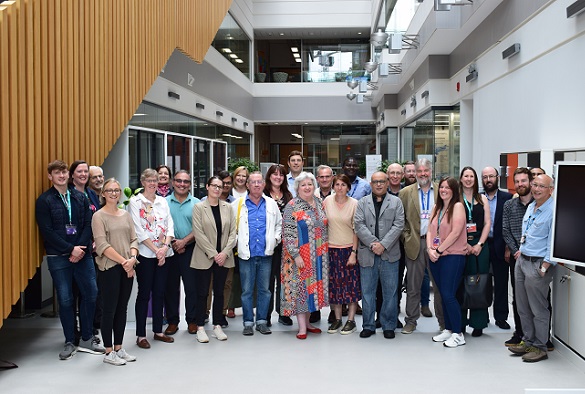Liverpool hosts LONGEVITY consortium

The Centre of Excellence for Long-acting Therapeutics (CELT) recently hosted an assembly of global partners to engage in important discussions regarding the next steps for their flagship LONGEVITY project. On the agenda were key aspects of the implementation plan including product development, patient advocacy, commercialisation, cost effectiveness and regulatory activities.
Funded by Unitaid, the LONGEVITY consortium aims to develop revolutionary long-acting injectable (LAI) medicines for the prevention of malaria and tuberculosis and a single-injection cure for hepatitis C virus. These new medicines will be deployed in low- and middle-income countries (LMICs) where there are approximately 300 million people living with these diseases and 2 million deaths occur each year.
The project uses University of Liverpool spin-out company, Tandem Nano Ltd.’s (TNL), patented Solid Drug Nanoparticle Technologies (SDNs) to reformulate pre-existing orally administered drugs as LAIs that require administration far less frequently, reducing issues around pill burden, stigma and relieving pressure on healthcare facilities and patients.
The work of the consortium has so far seen the project team achieve significant progress for each target disease, and the coming years are set to deliver against important new milestones for translation of these long-acting medicines. In the very near future, the first medicines will undergo rigorous formal safety assessments to support the first clinical trials in healthy volunteers. The meeting in Liverpool was critical to finalising specific strategies to accelerate these next steps in development.
Professor Andrew Owen, a co-director of CELT and principal investigator for the LONGEVITY project said: “The pandemic has necessitated that previous meetings be held virtually, and it has been inspiring to come together with long-term friends and collaborators for our first face-to-face consortium meeting
Through the commitment of all of our partners, the LONGEVITY project has made outstanding progress despite the challenges of COVID-19 and we are excited to move to the next steps of translation in the coming years.”
The project is a global collaboration and involves international partners and collaborators in the Clinton Health Access Initiative, Johns Hopkins University, Queens University Belfast, Medicines Patent Pool, Tandem Nano Ltd., Treatment Action Group and the University of Nebraska Medical Center.